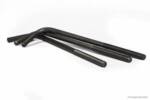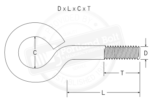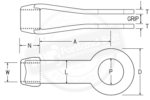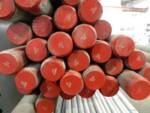Mike's FAQs
The vast majority of bolts that Portland Bolt provides are either hot-dip galvanized or plain steel with no coating. In the construction fasteners industry, we typically refer to the plain steel as “black.” On our quotes and orders at Portland Bolt, we abbreviate that to “blk”. Other companies may refer to bolts with no coating... Read more

There are a variety of ways Portland Bolt get can get your order to you. Because a very small portion of our orders are shipped within driving distance of our manufacturing facility, we don’t have our own delivery truck. We have several freight carriers that come in on a daily basis, and we have access... Read more

ASME, a global standards organization, provides dimensional guidelines and dimensional tolerances for a wide variety of fasteners and related items. Bent bolts, such as 90-degree bend anchor bolts, U-bolts, and eye bolts, fall under ASME B18.31.5. ASME B18.31.5 provides information regarding tolerances and quality, and their drawings also indicate where the bolts should be measured... Read more

ASTM A193 Grades B8 and B8M Class 2 are grades of stainless steel bolts that are strain hardened and therefore have higher yield and tensile strengths than A193 Grades B8 and B8M Class 1 bolts. However, the ASTM A193 specification does not indicate a nut requirement used with Class 2 bolts, other than simply A194... Read more
ASTM specifies the diameter range for F1554 grade 105 anchor bolts as ½” through 3”. What are the options for anchor bolts larger than 3” diameter of similar strength? Because the diameter range is clearly defined as ½” through 3” in the F1554 specification, an anchor bolt larger than 3” diameter can’t be certified to... Read more
Typically when bolts are ordered, they are called out by a specific ASTM or SAE grade. Stainless steel bolts are a bit different though, as they are commercially available and regularly ordered simply by the material itself, most commonly 316 or 304 stainless steel. Unlike bolts that fall under ASTM specifications, there are no specific... Read more
Clevises are a component of tie rod assemblies that rods thread into. Unlike most other female threaded components such as nuts or turnbuckles, calling out a clevis size by the diameter of rod being threaded into it is not the correct way to reference it. Clevises are called out by a number, ranging from a... Read more

In most cases, when specifying the length of a headed bolt, the thickness of the bolt head is not included. For instance, if you were to order a ¾” x 24” hex head bolt, the bolt would measure 24” from under the head. One exception to this method of measurement is countersunk bolts. When specifying... Read more
Calling out ASTM F1554 (grade 36, 55, or 105) indicates the grade of material, but the specification itself does not require a specific configuration and does not indicate whether or not the bolt is galvanized. F1554 is a fastener specification which covers steel anchor bolts intended for anchoring structural supports to concrete foundations. The specification provides... Read more

Rotational capacity testing is a test “intended to evaluate the presence of lubricant, the efficiency of lubricant, and the compatibility of assemblies.” The test is intended primarily for galvanized fasteners and fasteners that must be fully tensioned in structural applications. With A325 bolts now falling under the new F3125 specification, which covers high strength structural... Read more


